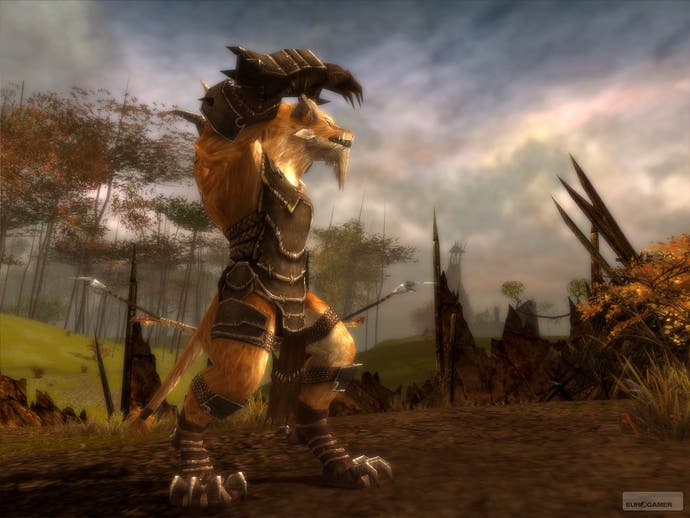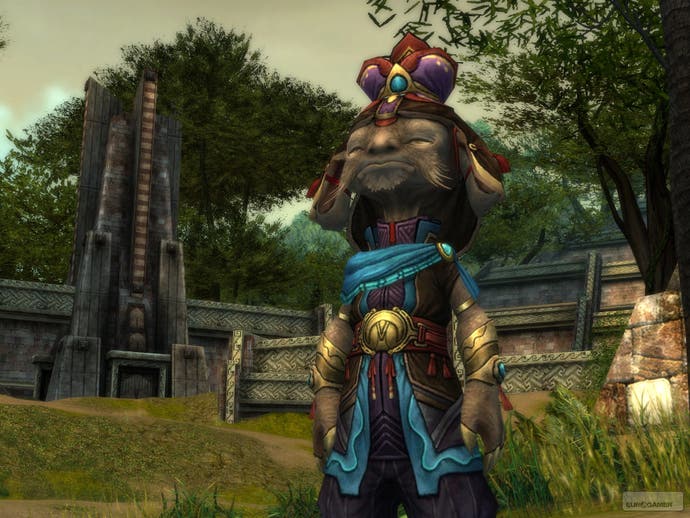The Guild Master
ArenaNet's Jeff Strain on the future of Guild Wars.
Second Coming
And so to Guild Wars 2; ArenaNet's second venture, but their fourth game. The very fact that we're talking about a sequel at this point reveals just how far the team has come from the conventional model of massively multiplayer games. Round about now in its lifespan, the average successful MMOG is sitting back on its laurels and sucking down the ongoing revenue from hundreds of thousands of hooked players. ArenaNet, meanwhile, are busily working away on the future.
"Because we are not a subscription based game, we can't just sit back and expect our players to pay us every month," Strain says. "What we need to do instead is give them new stuff to play with, new content. So, one way or the other we're always introducing new content to Guild Wars."
"The real question was, do we continue introducing new content into Guild Wars 1, or do we step back and evaluate what we've done with this game."
"We're very proud of what we've done with Guild Wars 1. As you know, it's very different to other online games. We've taken some pretty bold chances, not only on the business model but on the design of the game."
"Some of that has worked out fantastically for us - it's clear that the business model has worked out, I think the fundamental design mechanics of the game have worked out very well. Some other things, we would like another chance at. We would like to re-evaluate and re-do them."

Hence Guild Wars 2 - which Strain confidently describes as "the ultimate Guild Wars game", incorporating all of the ideas which the team has dreamed up based on feedback on the original title, but still fundamentally maintaining the core of the Guild Wars experience.
"We are introducing things like persistence into the world," Strain continues, "but we're retaining the core of what made Guild Wars fun, and what made it unique. We're also re-addressing some of the fundamental things like how the e-sport PvP works relative to the role-playing content, we're making a lot of refinements and enhancements to that, to give those communities more directly what they want."
Feedback from the community has been core to the design of the new game, with the team regarding Guild Wars as a successful experiment from which many lessons can be learned.
"One of the exciting things about GW2 is that, because we're starting from a position of having run Guild Wars 1 for two years, we've got millions of players around the world and we've got so much data to look at," Strain enthuses. "We very closely pay attention to the feedback, and we know what works and what doesn't work."
Which, of course, leads to a very obvious question - what does work, and what doesn't work?
Strain ponders for a moment. "I think that a couple of things surprised us," he begins. "First of all, it was always our expectation that after the release of a new campaign we would have a very large player population, and then we would see that substantially decay until the next release, when people would come back."

"We always knew that releasing new content would pull people back into it, and again, that's one of the strengths of the business model. But that decay curve did not turn out the way we thought. People start playing the game, and they keep playing it - even though we did not specifically engineer sticky, grind mechanics to keep people playing week after week after week, they do."
"We have introduced new features into the game, like title tracks - which did not even exist in the original Guild Wars - and that is to fulfil the needs of those players who just don't want to leave the world. So, that kind of caught us off-guard. We didn't really expect it. The daily player population of the game has only ever gone up, from the day we released the game. That took us a little bit by surprise."
